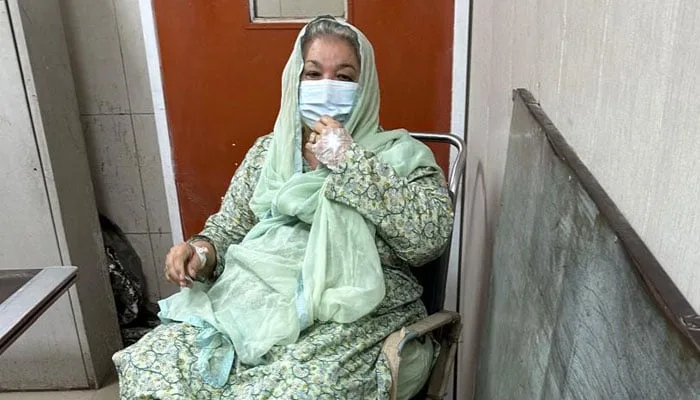In a recent development, Pakistan Tehreek-e-Insaf (PTI) leader Dr. Yasmin Rashid was shifted from Kot Lakhpat Jail to Services Hospital in Lahore due to deteriorating health. According to the hospital administration, Dr. Rashid has been experiencing severe stomach pain and vomiting, necessitating immediate medical attention and a 24-hour observation period.
The hospital administration reported that Dr. Rashid began vomiting while in jail and has since been complaining of persistent stomach pain. Preliminary scans have been conducted, and further tests are underway to diagnose the underlying cause of her symptoms. The authorities at Services Hospital emphasized that her condition requires close monitoring to ensure she receives the necessary medical care.
Dr. Rashid’s health condition became a cause for concern within Kot Lakhpat Jail, prompting the jail authorities to declare her an unfit prisoner. The jail administration detailed that her blood pressure had escalated significantly, and the continuous vomiting had led to severe nausea. Due to these symptoms, Dr. Rashid has been unable to consume any food since the morning, resulting in dehydration and further complicating her health status.
The decision to transfer Dr. Rashid to the hospital was made following her prolonged illness in jail, where the medical facilities were deemed inadequate to handle her condition. Her unwell state, marked by high blood pressure, vomiting, and dehydration, required more comprehensive medical facilities available at Services Hospital.
Dr. Yasmin Rashid, a prominent figure in the PTI, has had a distinguished career in both politics and medicine. Her sudden illness has garnered significant attention, given her critical role in the party and her past contributions to public health as a respected medical professional.
The Services Hospital administration is taking all necessary steps to ensure Dr. Rashid receives appropriate medical care. They are conducting a series of tests to pinpoint the exact cause of her illness, which will guide the subsequent treatment plan. Hospital sources indicate that while her condition is stable, it remains serious due to the combination of high blood pressure and dehydration.
In addition to the medical care provided, there are also concerns regarding Dr. Rashid’s overall well-being and the conditions in the jail that might have contributed to her health issues. The situation has sparked discussions about the treatment of political prisoners and the adequacy of medical facilities available in the prison system.
As Dr. Rashid undergoes treatment, her family, colleagues, and supporters are anxiously awaiting updates on her condition. The PTI leadership has expressed concern over her health and is closely monitoring the situation. They have called for ensuring that she receives the best possible medical care and have also raised questions about the circumstances leading to her illness while in custody.
The incident highlights the broader issues of health care within the prison system and the need for prompt medical attention for inmates. It underscores the importance of having robust medical facilities and protocols in place to address any health emergencies that may arise among prisoners.
Dr. Yasmin Rashid’s case is a stark reminder of the vulnerabilities faced by prisoners and the essential need for comprehensive health care services within jails. Her situation has brought to light the critical gaps in the prison health care system and the urgent need for reforms to ensure the well-being of all inmates.
As the medical team at Services Hospital continues to provide care, the focus remains on stabilizing Dr. Rashid’s condition and addressing the symptoms that have led to her hospitalization. The coming days will be crucial in determining her recovery and the long-term implications of her health issues.
Dr. Yasmin Rashid’s transfer to Services Hospital from Kot Lakhpat Jail due to severe health concerns has raised important questions about the adequacy of prison health care and the treatment of political prisoners. Her condition, marked by high blood pressure, vomiting, and dehydration, is being closely monitored by medical professionals, with further tests underway to ensure she receives the best possible care. The incident has highlighted the critical need for reforms in the prison health care system to prevent such occurrences in the future.



